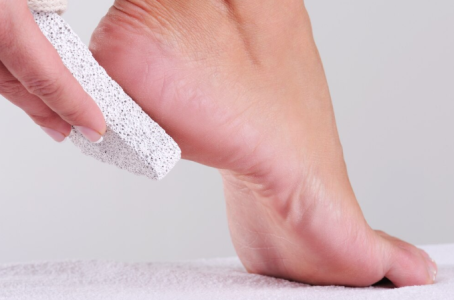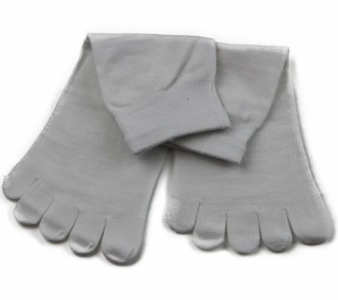Doctor reveals the shocking effects of improper foot hygiene
By
VanessaC
- Replies 5
When it comes to personal hygiene, our feet often get the short end of the stick.
While we meticulously scrub our faces and ensure our hands are clean, our feet—which carry us through the day—are frequently overlooked.
But a doctor has recently highlighted the importance of proper foot hygiene, revealing the shocking consequences of neglecting our soles.
Dr Poonam Desai's warning is clear: simply letting soapy water run over your feet in the shower is not enough.
This passive approach to foot hygiene can lead to a host of unpleasant and potentially serious issues.
From bad odour to bacterial and fungal infections, the risks are too significant to ignore.
The feet are a prime environment for bacteria and fungi to thrive, thanks to the warm, moist conditions often found in shoes and socks.
When we don't wash our feet properly, we're allowing these microorganisms to multiply, which can lead to odour—a telltale sign of bacteria at work.
But the problems don't stop there.
Blisters, calluses, and dried, cracked heels are also the result of inadequate foot care.
Dr Desai emphasised the need to actively scrub your feet, paying particular attention to the areas between your toes.
You can watch her full video below:
Video source: Instagram/@doctoranddancer.
'Just letting soap and water wash your feet may not be enough for hygiene,' the doctor said.
'Don’t just to let the soapy water run down your body and kind of passively wash your feet. What I mean is you need to use soap and water to scrub your feet.'
'The reason is if you don’t wash your feet regularly, it could lead to a stinky odour and that is bacteria building up in there causing an odour.'
'It could also lead to dry, crackly skin and calluses, as well as bacterial and fungal infection, especially if you end up with a cut down there that could lead to an infection.'
But how often should you wash your feet?
The answer is daily.
Health Direct advised that a good foot health routine involves washing, drying, and moisturising your feet every day to maintain their health.
This routine should also include cutting toenails straight across to avoid ingrown nails, filing any sharp edges, and avoiding over-the-counter corn cures that may not be suitable for your specific needs.
Moreover, it's important to choose the right footwear.
Tight socks or stockings can exacerbate foot problems by restricting circulation and causing friction.
Instead, opt for breathable materials and ensure your shoes fit well to prevent unnecessary pressure on your feet.
If you notice any changes or problems with your feet, it's crucial to seek professional help.
A podiatrist or physiotherapist can provide specialised care, and your GP can guide you towards the appropriate treatment.

What are your thoughts on this story, dear members? Do you do this on a daily basis? Let us know in the comments below!
While we meticulously scrub our faces and ensure our hands are clean, our feet—which carry us through the day—are frequently overlooked.
But a doctor has recently highlighted the importance of proper foot hygiene, revealing the shocking consequences of neglecting our soles.
Dr Poonam Desai's warning is clear: simply letting soapy water run over your feet in the shower is not enough.
This passive approach to foot hygiene can lead to a host of unpleasant and potentially serious issues.
From bad odour to bacterial and fungal infections, the risks are too significant to ignore.
The feet are a prime environment for bacteria and fungi to thrive, thanks to the warm, moist conditions often found in shoes and socks.
When we don't wash our feet properly, we're allowing these microorganisms to multiply, which can lead to odour—a telltale sign of bacteria at work.
But the problems don't stop there.
Blisters, calluses, and dried, cracked heels are also the result of inadequate foot care.
Dr Desai emphasised the need to actively scrub your feet, paying particular attention to the areas between your toes.
You can watch her full video below:
Video source: Instagram/@doctoranddancer.
'Just letting soap and water wash your feet may not be enough for hygiene,' the doctor said.
'Don’t just to let the soapy water run down your body and kind of passively wash your feet. What I mean is you need to use soap and water to scrub your feet.'
'The reason is if you don’t wash your feet regularly, it could lead to a stinky odour and that is bacteria building up in there causing an odour.'
'It could also lead to dry, crackly skin and calluses, as well as bacterial and fungal infection, especially if you end up with a cut down there that could lead to an infection.'
But how often should you wash your feet?
The answer is daily.
Health Direct advised that a good foot health routine involves washing, drying, and moisturising your feet every day to maintain their health.
This routine should also include cutting toenails straight across to avoid ingrown nails, filing any sharp edges, and avoiding over-the-counter corn cures that may not be suitable for your specific needs.
Moreover, it's important to choose the right footwear.
Tight socks or stockings can exacerbate foot problems by restricting circulation and causing friction.
Instead, opt for breathable materials and ensure your shoes fit well to prevent unnecessary pressure on your feet.
If you notice any changes or problems with your feet, it's crucial to seek professional help.
A podiatrist or physiotherapist can provide specialised care, and your GP can guide you towards the appropriate treatment.
Key Takeaways
- Dr Poonam Desai advised that simply letting soapy water run over your feet in the shower is not adequate for preventing infections and maintaining proper foot hygiene.
- It's important to scrub your feet, including in between the toes and heels, with soap and water to avoid odour, bacteria, and fungal build-ups.
- Neglecting proper foot washing can lead to unpleasant odours, bacterial and fungal infections, and may contribute to dry, cracked skin and calluses.
- The recommended daily foot care routine included washing, drying, and moisturising your feet every day, as well as properly trimming toenails and seeking professional advice when noticing any foot problems.









